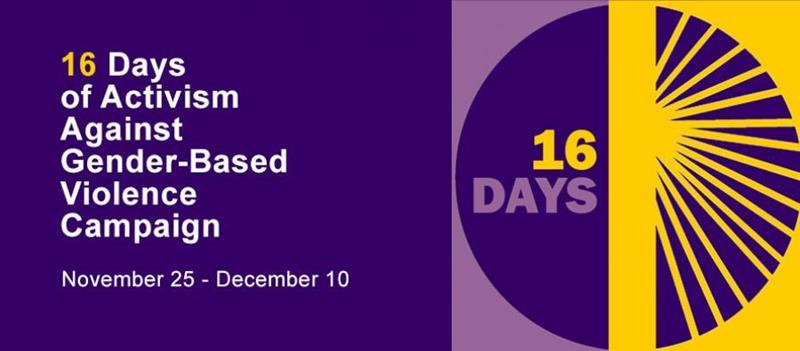Source: Rights groups galvanise GBV fight – DailyNews Live
Caroline Chiimba 2 December 2018
HARARE – As part of activities marking the 16 Days of Activism Against
Gender-Based Violence – a campaign to galvanise action to end violence
against women and girls around the world -Zimbabwean campaigners have
joined those around the world to challenge attitudes on violence against
women and girls.
The campaign began on International Day for the Elimination of Violence
Against Women and ends on Human Rights Day.
With a new wave of activists standing up to entrenched and worsening
gender violence in Zimbabwe, campaigners have hosted a range of
activities, including conversations about gender inequality, amid a push
for a greater cause of realising equal treatment of all genders amid
worsening economic hardships.
The talk is centring around teaching men to have a greater sense of
wanting to learn more about alternative masculinity and tools they can use
to self-introspect.
According to the World Bank, gender-based violence (GBV) or violence
against women and girls is a global pandemic that affects 1 in 3 women in
their lifetime which translates to 35 percent.
At home, Zimbabwe National Statistics Agency (Zimstat) recorded that 8 069
women were raped in 2016 while recent statistics for the first quarter of
2018 released in May this year recorded that 7 394 rape cases were
reported in 2017.
These narratives influenced the intense activism against GBV around the
country with activists calling for a stop to this barbaric act.
Speaking to the Daily News on Sunday, women activist groups and individual
activists poured their hearts out on the kind of a world they want for
women, and the set goals they are still fighting to achieve.
Shamwari Yemwanasikana director Ekenia Chifamba, who is also women and
girls rights activist, said the ongoing campaign so far has led to
increased uptake in information that has been disseminated to the various
members of public in the fight against GBV.
“The ministry of Women Affairs has declared 365 Days of Activism and has
put in Gender Focal Persons in every other government department or
ministry,” Chifamba said.
She, however, said there is still an increase in GBV cases due to diverse
factors such as the harsh economic climate as well as deeply rooted social
norms, where GBV is mostly driven by patriarchy which gives a false sense
of control on men and boys.
“The way men and boys are socialised gives them a status to show off their
strength using any means possible including violence and the lack of
positive role models around. GBV is often within families and even
cultivated by culture and religion,” Chifamba added.
“We still have men in our societies who do not believe in equality, and do
not care about how women feel about issues like leadership and
development.”
“Women have been conditioned by society to suffer in silence, they have
been brought up in a manner that suggests that their own pain, feelings or
emotions do not matter, and they are there to just satisfy their
husbands.”
Commenting on the reasons that make women vulnerable, Chifamba said lack
of economic power among women was another driver of GBV as men own 90
percent of the resources while women only have the remaining meagre 10
percent, according to research, thus men continue to suppress women as
they have the upper hand.
Chifamba added that the Shamwari Yemwanasikana organisation hopes to see a
Zimbabwe where girls and women’s overall rights are respected, cherished
and upheld at all levels, with men and boys being pillars of support and
embracing gender equality not as a duty but as a necessity.
“All these drivers can be tamed through a multi-sector and
well-coordinated GBV response mechanism that is not rigid but driven by
all the concerned stakeholders, by having one coordinating mechanism, one
monitoring and evaluation system as well as one plan of action,” she
added.
Thandolwenkosi Gwinji, a gender and youth empowerment activist, also
emphasised that patriarchy and intolerance from chauvinistic men are the
major drivers of GBV.
Gwinji said as women and the world commemorate the 16 Days of Activism
Against GBV, activists and organisations should be always reminded of what
their priorities are as activists, and to continue intensifying campaigns
that raise awareness on the GBV.
Over the years, women rights activist groups have held yearly campaigns
under different themes in order to touch and focus on specific elements
that cause GBV with this year’s focus on creating safe spaces for women at
their workplace.
“Intense engagement of men and boys is very crucial in having role models
who can positively mould their peers to be violent free, churches also
need to have intensive programmes that address GBV from the pulpit as well
as within the various church circles,” said Gwinji.
She added that there is need for political will in aligning the laws and
policies that address GBV by the various policy makers and leaders so that
there is a culture of prevention as well as strengthening of safety nets
around GBV.
“If the deeply rooted norms are dealt with head on impartially, then GBV
can be a thing of the past.”

COMMENTS